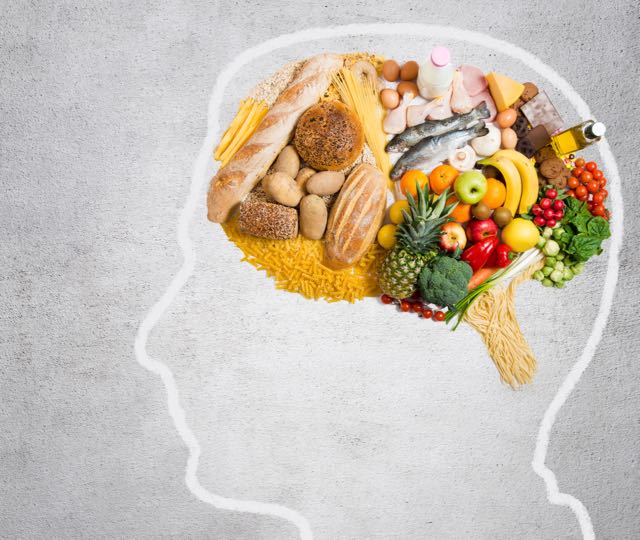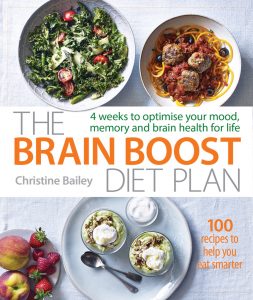Nootropics: The ultimate brain food?
Do you feel like your brain needs a bit of a mental boost but don’t want to overdo it with stimulants? Enter the world of nootropics or cognitive enhancers. These are the latest health hack people are trying to improve their productivity and boost mental performance. Of course there are many factors that can affect a person’s brain function – age can be a factor of course but so too can a stressful lifestyle, poor diet and lack of activity. So if you haven’t got the basics right don’t expect any natural nootropic to significantly boost brain function. I explain some of the key dietary and lifestyle factors to consider in my Brain Boost Diet.

What are Nootropics?
Nootropics cover a broad category of compounds with ‘cognitive boosting properties’. They can help increase your memory, boost learning ability, improve your mood and assist overall brain function. There is a little confusion between natural and synthetic here. Some people distinguish between natural nootropics and the synthetic versions as ‘smart drugs’. Broadly speaking nootropics are compounds – natural or otherwise that enhance cognition and memory and facilitate learning. The term was first used to describe the racetam family of drugs, which are sometimes referred to as smart drugs. However It is worth mentioning that there is a lack of any proper scientific evidence to determine the effectiveness and safety of any racetam and while there are other prescription drugs are out there, they also come with side effects.
Thankfully there are a number of natural compounds that appear to act as nootropics. These may be useful if you are undertaking demanding tasks or looking to improve overall cognitive performance or focus and concentration. Not surprisingly they are popular in the corporate, student and professional sector.
Whether natural options will benefit you is very individual and your choice will depend on what you are looking to improve? For example are you looking to boost memory, increase focus and concentration or speed of thinking? You may need to try a few at different doses to find out which ones are best for you. Don’t expect to enhance your brain capacity as in the film ‘limitless’ by the way. While there are many claims for the use of certain nutrients as nootropics only a few have any reasonable amount of research to support their use as such. Here are my top choices to try.
Huperzine A
Huperzine A is probably one of the best researched. This is a plant derived compound that may act as a cognitive enhancer for young people and improve memory in people with cognitive dysfunction. One study indicates that it may be useful for improving brain performance in students.
One of the ways it may improve memory is by increasing acetylcholine which is does by inhibiting an enzyme acetylcholinesterase responsible for breaking down this neurotransmitter.
Other functions may involve increasing growth factors like BDNF (brain derived neurotrophic factor) and NGF (nerve growth factor) which help protect the brain and may enhance memory and brain function.
As mentioned in a previous blog post enhancing circulation in the brain is equally important for cognition and it appears from one study that Huperzine may also work in this way helping with oxygenation and lowering inflammation.
Citicoline (CDP-Choline)
Citicoline is an intermediate in the creation of phosphatidylcholine from choline. This is important for the production of our memory neurotransmitter acetylcholine. Both citicoline and choline are important when it comes to memory and dietary studies suggest that many people fall short of getting sufficient choline in their diet. So for many people supplementation may be beneficial. Various studies it may improve memory and learning particularly in cases of memory impairment.
It may also benefit brain function through increasing levels of the antioxidant glutathione which helps protect neurons from damage and lowers inflammation.
Panax Ginseng
Various herbs have been suggested as cognitive enhancers one of these is panax ginseng. While there are limited studies some papers suggest it may have memory enhancing benefits.
This may be due to its effects on increasing circulation and blood flow through the release of nitric oxide. It may also directly influence levels of neurotransmitters such as dopamine and serotonin.
Ginkgo Biloba
Another popular herb is Ginkgo biloba. Research is limited but some studies suggest it may be useful for Alzheimer’s disease and memory decline.
In combination with panax ginseng it may increase levels of acetylcholine which could explain its memory enhancing benefits. It also acts as an antioxidant thereby helping protect neurons and lower inflammation. With regards to how much you need one study concluded that Gingko has potentially beneficial effects for people when it is administered at doses greater than 200mg/day for at least 5 months.
Bacopa Monnieri
Bacopa monnieri, also called brahmi, water hyssop, thyme-leaved gratiola, and herb of grace, is a staple plant in traditional Ayurvedic medicine. Early studies report it can help with improving attention and working memory. Results can be evident within 12 weeks.
One of the mechanisms behind its benefits appears to be its ability to increase levels of acetylcholine by inhibiting acetylcholinesterase and/or choline acetyltransferase). It may also increase serotonin levels and protect the brain from oxidative stress by improving antioxidant levels. It may also stimulate nitric oxide production and thereby boost blood brain flow.
Butyrate
You may be aware of the gut-brain axis. Well a short chain fatty acid butyrate appears to have potential for long term memory. While much of the studies are animal studies it appears that butyrate increases activity in the hippocampus and enhance levels of growth factors such as BDNF and NGF. So butyrate may be particularly useful if you are looking to enhance memory.
Creatine
Creatine is not just for bodybuilders. One of its main roles is in the recycling ATP primarily in the brain and muscles. Particularly useful when combined with exercise it may have a protective effect on the brain. Certainly supplementation in the elderly appears to be beneficial.
You don’t need much either. In this review they suggest that 2g a day may be effective.
L Theanine
Found in black and green tea L theanine is an amino acid shown to aid relaxation, focus and alertness. Theanine also works synergistically with caffeine. Together, they increase reaction time, memory, and mental endurance. L-theanine has also been used to promote focus and relaxation. In fact studies have shown it can increases brain serotonin, dopamine, and GABA levels.
Simply drinking 2-3 cups of green tea a day may be sufficient for you or you can try a supplement.
Phosphatidylserine (PS)
Phosphatidylserine is vitally important for healthy nerve cell membranes and myelin. Aging of the human brain is associated with biochemical alterations and structural deterioration that impair neurotransmission. Taking supplements of PS (300-800 mg/d) has been shown to cross the blood-brain barrier, and safely slows, halts, or reverses biochemical alterations and structural deterioration in nerve cells. It supports a number of cognitive functions, including the formation of short-term memory, the consolidation of long-term memory, the ability to create new memories, the ability to retrieve memories, the ability to learn and recall information, the ability to focus attention and concentrate, the ability to solve problems and the ability to communicate.
So a great choice for many of us.
Lion’s Mane Mushroom
Lion’s mane mushroom, has been shown to have various health benefits, including antioxidative, antidiabetic, anti-inflammatory, antimicrobial and hypolipidemic effects. It has been used to treat cognitive impairment, Parkinson’s disease, and Alzheimer’s disease having benefits on levels of BDNF.
Ashwagandha
Ashwagandha has been used in traditional Indian medicine (Ayurveda) for centuries particularly for help with resilience, nervous exhaustion, insomnia, and loss of memory. Various studies suggest its use for brain function and its potential for acting as a neuroprotective. Another study discussing its value as a nootrophic suggests it may be of benefit for cognitive decline.
Fish oil
Fish oil is a great source of anti-inflammatory, omega-3 healthy fats. It contains two omega-3 fatty acids known as eicosapentaenoic acid (EPA) and docosahexaenoic acid (DHA).
We all know that the brain is rich in omega 3 fats (DHA and EPA) so it should come as no surprise that boosting your intake may promote a sharper brain.
Epidemiologic studies suggest that a diet rich in fish is associated with less cognitive decline and with a decreased risk of Alzheimer’s disease.
In two studies of 1,600 older participants, increased consumption of fish oil and dietary fish was associated with lower rates of Alzheimer’s.
If you aren’t eating fish or very little then consider supplementing with omega 3.
Importance of Lifestyle
Reducing and managing stress, exercise and sleep, mental stimulation as well as social connections are equally important when it comes to our brain health long term.
You should also ensure you get enough sun and vitamin D levels are optimal.
Add to this a diet rich in colourful fruits and vegetables, oily fish, MCT oils, Vitamin E rich foods (nuts, seeds etc) and spices like saffron and turmeric. These are all the key principles I outline in my brain boost diet. Some people also find Ketogenic diets and intermittent fasting helps and certainly reducing overall carbohydrates and balancing blood sugar can make a significant difference.














